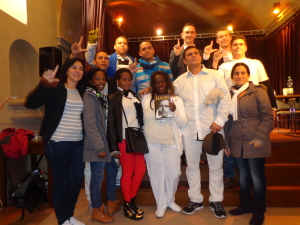These days in Prague, as I am pursuing my quest for learning about democracy, I met a group of Cubans who were invited by the Czech NGO People in Need (PIN) and the Human Rights Commission of the Evangelical Church to participate in a march to express support for the Ladies in White, a group of ladies that advocate for upholding human rights and release of political prisoners in Cuba.
As we walked out of the church Martin ve Zdi, located close to the Wenceslas square and the Old Town Square, every participant grasped a white umbrella and a white balloon, as well as banners with slogans requesting an immediate release of one of the most recent political prisoners known for his artistic name “El Sexto” (“The Sixth”) who was detained as he was attempting to give a performance that he did not succeed to orchestrate. Consequently, his name was added to the long list of Cuban prisoners who remain in jail accused of crimes they did not commit.

The march started with a modest group of Czechs and Cubans. However, as we were walking across the Charles Bridge, the group grew in number. The emotions erupted when the young Cuban activists started to shout: “What do we want?” “Freedom,” “Down with the Castros!,” “Freedom for Cuba!.” As I was taking pictures of this event, I realized that, through their smiles and shouts, I was probably witnessing their first opportunity to exercise the freedom of expression that bears no consequences.
There is no doubt that this white, human wave of solidarity demonstrated that Prague is a great place for multicultural encounters in which people are made aware of nations, such as Cuba, that have been oppressed and disrespected by one of the most fierce communist regimes – the one of the Castro brothers.
“This is for me a very liberating moment… if you participate in a similar march in Cuba, the only response you will get is beating. And here we are invited to an official event where the participants appreciate and congratulate us.. Prague has treated us so well,” one Cuban activist said.
“How well it feels to experience the freedom of expression for real. While here in the Czech Republic we can shout out demanding our rights and we are treated well after the march, in Cuba the response would be a police stick and probably a detention too, “ other Cuban activist confided.
A similar march took place last year and the participants were demanding release of the Lady in White, Sonia Garro. After almost three years in prison in Cuba, she was able to participate in this demonstration and, during a debate with the Czech civil society, she narrated her extraordinary story of resistance experienced in the Cuban prison.
“In Cuba if you participate in the human rights advocacy movement, there is always a possibility that you will be detained without having committed any crime. The treatment in the prisons is worse for political prisoners. Without giving you a reason, they close you up to for 3 or 4 months in a small cell, they serve you non- potable water, the food is spoiled.. That is why I was infected with two dangerous bacteria and, as a result of that, my health condition has gotten much worse… They [political prisoners] also receive smaller portions of food and visits of family members are routinely suspended,” said Sonia Garro.
Special ending:
After and intensive debate on the political panorama of Cuba, Sonia Garro received a gift- biography of Vaclav Havel – from the Human Rights Commission of the Evangelical Church. The Ambassador Milan Jakobec surprised everybody with a song that he composed and dedicated to Sonia. His small performance ended up being one of the most special moments of the evening. The young Cuban activists sang along and enjoyed together this expression of appreciation and affection.
The participants at the panel discussion were Daniel Herman, the Minister of Culture of the Czech Republic, Simon Panek, PIN’s Director, and Ondrej Jurik, Head of PIN’s Latin American Section.

Leave a comment